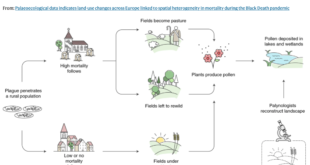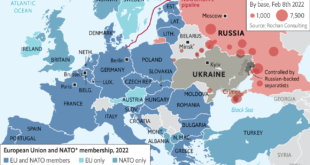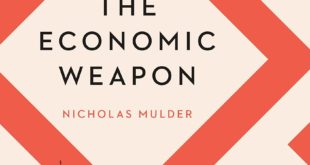Few doubt that the mid-fourteenth-century Afro-Eurasian plague pandemic, the Black Death, killed tens of millions of people. In western Asia and Europe, where its spread and mortality are best understood, upwards of 50% of the population is thought to have died within approximately 5 years. …The regionality of the plague’s mortality is particularly underexplored, owing to the availability of written sources and the limits of traditional historical methods. Here we pioneer a new approach, big...
Read More »Who votes versus who decides in the Democratic party
Democratic voters comprise a multiracial but predominantly white group of college graduates and a larger group of non-college voters. The non-college share of the Democratic coalition is split about 50:50 between white (of which non-college whites are such a large share of the American population that they accounted for fully one-third of Joe Biden’s voters, despite voting overwhelmingly for Trump) and non-white individuals. It is overall much less liberal on a range of issues, especially...
Read More »When we focus on Russian aggression and motives, are we asking the wrong questions?
Here’s a thought experiment I think it’s useful to perform. Start by assuming that Ukrainians and NATO could make invasion painful for Russia, but that Russia has the military forces to overwhelm Ukraine, the foreign reserves to survive sanctions, and the resolve to invade despite these costs and risks, should Putin not get what he wants. If you take these assumptions as true, then I think you’re forced to conclude that there will be peace if Ukraine and NATO more or less capitulates, and...
Read More »The most worrisome thing I’ve read on Russia
A few weeks ago I explained why I thought a Russian invasion of Ukraine was unlikely. Last week I said rumors of another American civil war are exaggerated. That’s when my colleague Konstantin Sonin tweeted something unexpected, connecting the two: My @HarrisPolicy colleague @cblatts has an excellent piece on prospects of a new civil war in the U.S. I wish Kremlin had read this some time ago – you wouldn’t believe to what extent they rely on the idea that the U.S. is on the brink of a civil...
Read More »The invention of sanctions
The Biden administration is relying on the promise of harsh economic penalties to avert a Russian invasion of Ukraine. That’s just one of the instances where it’s wielding those tools. When were modern economic sanctions invented? In the aftermath of World War I, is one answer. Yesterday Adam Tooze reviewed a new history of this tool, The Economic Weapon, by Nicholas Mulder. Fighting was ruinous. But here was a multinational instrument, still painful to wield, but better than most of the...
Read More »Links I liked
Photoessay: Polar bears living in an abandoned weather station in Kolyuchin (Russia) One reason Russia is strategically powerful is because much of Europe abandoned nuclear power for natural gas from the east (or so goes one account. This was an interesting article on why it’s so hard to rebuild support for new nuclear plants in Western Europe. Late night at the video store, 1993 I am loving John Holbein’s newsletter, the Social Science Research Roundup, including articles this week on how...
Read More »Computer viruses don’t come with a return address
Is a renegade American responsible for shutting down much of North Korea’s internet? Just over a year ago, an independent hacker who goes by the handle P4x was himself hacked by North Korean spies. P4x was just one victim of a hacking campaign that targeted Western security researchers with the apparent aim of stealing their hacking tools and details about software vulnerabilities. He says he managed to prevent those hackers from swiping anything of value from him. But he nonetheless felt...
Read More »Innovations in activism (and other ways to scale your efforts)
One last example of a recent technology that scaled exceptionally well comes not from business but from social activism. In the days following the murder of George Floyd by Minneapolis police officer Derek Chauvin in the spring of 2020, before anyone had been charged with a crime, the Grassroots Law Project organized a call drive to flood the phone lines and answering machines of public officials in Minnesota to demand justice. All volunteers had to do was call the number the Grassroots Law...
Read More »Links I liked
The best of dibs in Chicago: A photo essay of the objects people use to assert their property rights over a snow-filled parking spot they have shoveled. (This doesn’t always work so well in Hyde Park, with so many out-of-town residents. Last year someone walked off with my kitchen step-stool thinking it was left in the street for free. Norms are hard.) On the continuing theme of pandemic fiction, I just read Mary Shelley’s The Last Man. I won’t write a full post because I don’t recommend it...
Read More »Choose your own anti-science
On Tuesday I pointed to research that the Green Revolution might be the greatest antidote to poverty and poor health in human history. The revolution continues, with more and better crops and techniques available every year. Today, however, the main hurdles aren’t technology and logistics, but rather regulation and politics. One follower, for instance, sent me to this tweet: A modern variety of Golden Rice, GR2E, is safe, high-yielding and rich in beta carotene. That hasn’t stopped anti-GMO...
Read More » Chris Blattman
Chris Blattman




